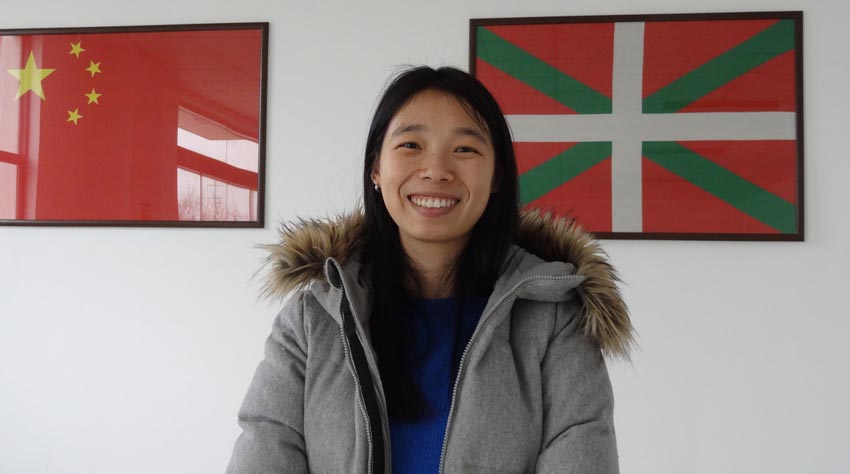Her name is Huang Hui, even though her Basque friends know her as Marta. She is 27 years old and works as chief of personnel in the Elay Company from Antzuola in Shanghai-Kunshan. She studies Basque on Skype.
basque heritage worldwide

02/05/2015

ADVERTISING
Her name is Huang Hui, even though her Basque friends know her as Marta. She is 27 years old and works as chief of personnel in the Elay Company from Antzuola in Shanghai-Kunshan. She studies Basque on Skype.
Joseba Etxarri/Shanghai, China. She started learning Basque two years ago. She takes weekly classes in Shanghai via Skype and last summer she spent a month at the Lazkao Barnetegi. With this background, she greeted us in her office in Basque at the Elay Company headquarters in China. This company’s commitment to the Basque language lies in facilitating its study and allowing its employees to deepen their knowledge of Euskara. That is what our interviewee did, and so we held our conversation in Basque.
-Huang Hui or Marta?
-Huang Hui.
-Why Marta?
-I like languages and I learned English, later Spanish and now Basque. In one of my Spanish classes, our teacher asked us to choose a name. I like Marta and so ever since, I’m Marta for many.
-In a globalized world where many people study Chinese, in your case, being Chinese, you study Basque.
-I like Basque; it is a beautiful language to me. I also work with Basques that speak it and I realized that I should learn it. I am happy, and so are they. It is another tool for me, it helps me in my work and it is also something I like. In my opinion the native language is very important for a country, something that needs to be protected and cultivated.
-You’ve been to Euskadi three times.
-The first time was three years ago. We visited the headquarters of our company and that impacted me, since I was expecting an urban setting with tall buildings, avenues and shopping centers, like in Shanghai. What I saw were mountains and green pastures, it was very beautiful and not at all what I was expecting.
-I’m sure you must have an anecdote…
-Ummm (thinking)…This happened this last summer, we were going out to Zaldibia, for their town festival and they told me that we were going to a concert. I nodded, great, and it was time for the concert and they started playing music from the Basque Country. There were many young people who were very happy, dancing…. It was a total surprise for me. In China, a concert is either rock or pop but not Chinese music. In addition, in China, youth aren’t interested in traditional or the folkloric music of China, they usually don’t attend.
-I was told that you are a pretty good Basque dancer.
-Well (smiling), I learned some steps at the Barnetegi, in Maizpide: Jota, aurresku, zazpi jauzi…
-We belong, Chinese and Basques, or Chinese and Westerns, to two very different worlds as they say?
-We also have similarities. For example, Chinese and Basques are both very good people (jatorrak) and rather timid, very busy, even though Basques party more.
-How’s that?
-Maybe that’s one of our greatest differences. Chinese don’t party, especially after we are married. We stay at home. Sometimes we go out with friends, but not much. Maybe for dinner, but not for drinking. We drink during dinner, but later we go home since we don’t go to the bars.
-In general, how do you see Basques?
In my opinion, Basques are initially very serious, but once you get to know them they are good friends and jatorrak (good people) and have a great sense of humor. I work happily with them.
ADVERTISING
ADVERTISING
ADVERTISING
ADVERTISING
ADVERTISING
© 2014 - 2019 Basque Heritage Elkartea
Bera Bera 73
20009 Donostia / San Sebastián
Tel: (+34) 943 316170
Email: info@euskalkultura.eus